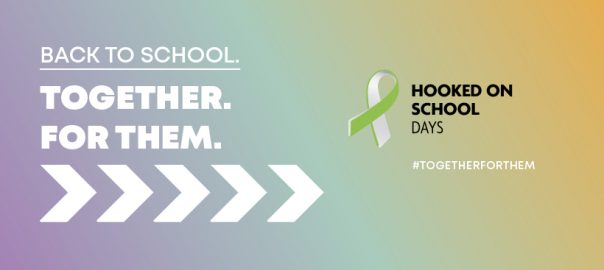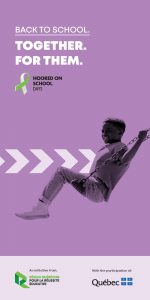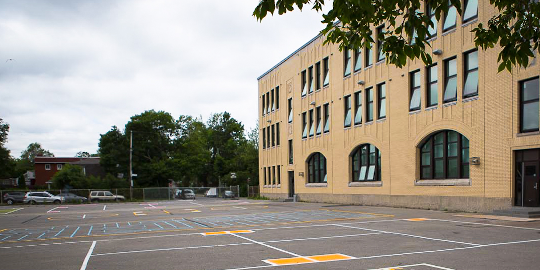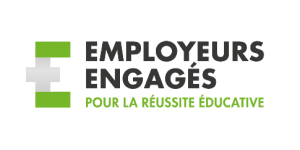Press release
Québec government invests in school perseverance initiatives of Montreal Hooked on School
Montreal, May 30, 2016 – Montreal Hooked on School (MHS) is extremely pleased with the Québec government’s announcement to invest nearly $2.8 million in MHS’s initiatives to promote school perseverance among young Montrealers.
“We thank the government for this vote of confidence in Montreal Hooked on School’s capacity to mobilize Montreal society and organizations from all sectors toward engagement in school perseverance. This investment will allow us to continue the work we started in 2009 with our local and regional partners,” notes Pierre Boulay, first vice-chair of Montreal Hooked on School’s board of trustees and director general of the Commission scolaire de la Pointe-de-l’Île.
MHS: helping communities mobilize around school perseverance
The government announced the funding for Montreal Hooked on School this morning at Calixa-Lavallée high school in Montréal-Nord. The school’s close ties with the local community include hosting the organization Programme Horizon Jeunesse. This collaboration between Calixa-Lavallée, Horizon Jeunesse, and other local stakeholders is a tangible illustration of how a mobilized community can benefit young people. “We must work together for our young people! Here in Montréal-Nord, we have a number of projects that involve the entire community. Thanks to the support of Montreal Hooked on School, we have school/family/community partnership agents who work with all local schools and organizations, which benefits all of our young people and their families. MHS has also helped Programme Horizon Jeunesse build partnerships and broaden its activities to include initiatives designed to help youth develop their professional aspirations,” explains Pierre-Richard Simon, director of Programme Horizon Jeunesse.
A strategy to support coordinated local initiatives
Montréal-Nord is one of the neighbourhoods where MHS has implemented its strategy to support and guide coordinated local action. This strategy focuses on coordinating the priorities of schools and communities and on partnerships between organizations in order to help young people persevere and succeed in school. This joint engagement of stakeholders has borne fruit: more youth in Montréal-Nord are staying in school. “The new impetus provided by Montreal Hooked on School has allowed us to come together as a community and concentrate on the actions that benefit young people the most. We are now seeing the tangible results of these joint efforts: a reduction in the dropout rate at local-area schools. But the work isn’t finished yet; we also must persevere to ensure that all of our young people succeed at school,” stresses Dominic Blanchette, principal of Calixa-Lavallée high school.
School perseverance in Montreal: the situation is improving
The high school graduation rate in Montreal has risen from 67.7 percent in 2009 to 76 percent in 2014. These numbers reflect the tireless work of hundreds of organizations and stakeholders in all sectors working with parents, teachers, and school administrations to help kids succeed at school. However, the dropout rate remains significant: one young Montrealer in five still drops out before getting a high school diploma or equivalent. To achieve and surpass the Québec government graduation-rate target (80 percent by 2020), we must continue to improve the situation of young people in Montreal.
Montréal-Nord by the numbers (French-language schools)
- Rate of high-school leaving without a high school diploma or qualification: 6 to 35.0 percent (depending on school)
- Rate of vulnerability of kindergarten-aged children in at least one developmental domain:8 to 40.7 percent (depending on sub-territory)
- Socio-economic environment index (IMSE) decile: 9 to 10 (depending on school) (decile 1 comprises schools with students primarily from the most privileged environments, while decile 10 comprises schools with students primarily from the most underprivileged environments – source: Ministère de l’Éducation et de l’Enseignement supérieur)
About Montreal Hooked on School
Montreal Hooked on School is Montreal’s regional consulting authority on school perseverance. With the support of 33 regional members, including the island’s five school boards, MHS mobilizes and catalyzes Montreal stakeholders in a coordinated effort to implement activities that help young people persevere and succeed in school or reengage with school. In 2014–15, as part of its strategy to support and guide local coordinated action, MHS took part in developing and carrying out 16 action plans and supported the implementation of 165 initiatives that affected 49,184 children, students, and parents in 11 of Montreal’s most sensitive neighbourhoods. In addition, through its regional efforts, MHS guided work on broader issues related to school perseverance, such as school perseverance and gender, work/school balance and Hooked on School Days.



















